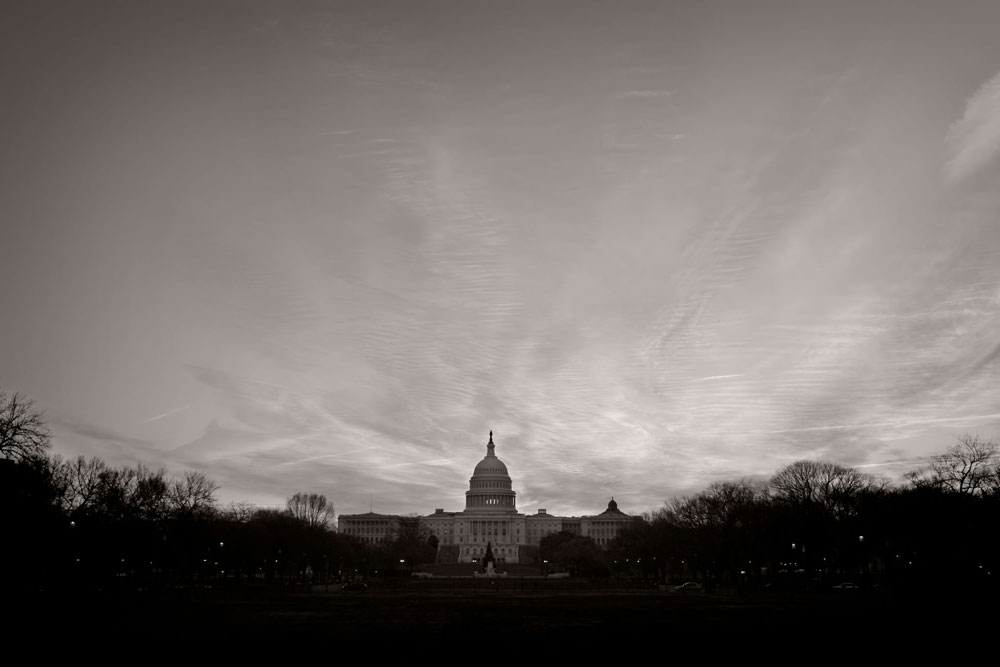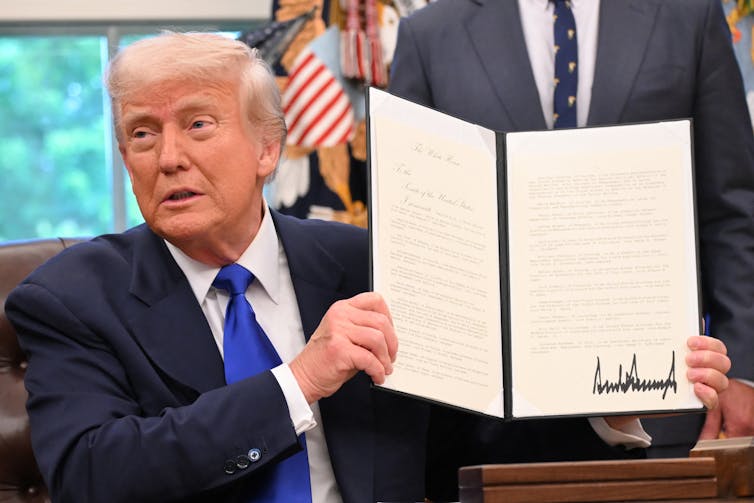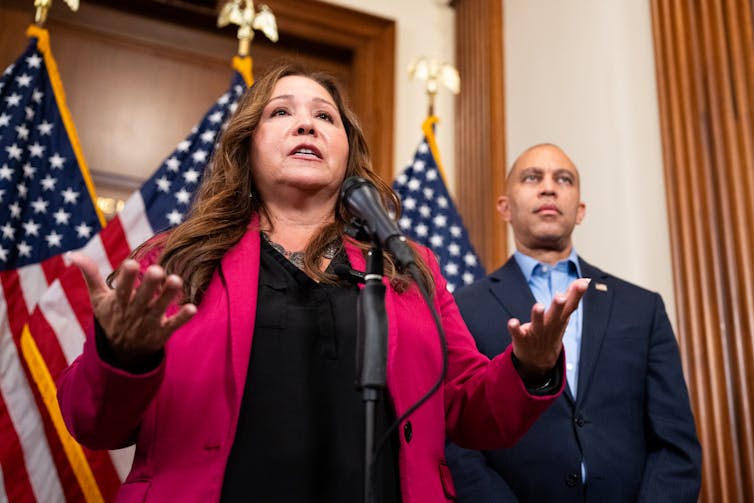
By Charlie Hunt
Many Americans will be voting on Election Day – or have already cast votes – in races for statewide office, local positions and on ballot initiatives with major implications for democracy.
Congress is not on the ballot this November, but it will be in the 2026 midterms. A year from now, Americans in every state and district will get to vote for whom they want representing their interests in Washington.
But right now, Congress isn’t giving the American people much to go on.
As the shutdown of the federal government passes the one-month mark, the U.S. House of Representatives has been in recess for over 40 days. That’s the longest it’s ever stayed out of town outside of its typical summer recesses or the weeks leading up to their own elections.
Notably, the shutdown does not mean that Congress can’t meet. In fact, it must meet to end the shutdown legislatively. The Senate, for example, has taken votes recently on judicial nominations, a major defense authorization bill and a resolution on tariff policy.
Senators have also continued to hold bipartisan behind-the-scenes negotiations to end the shutdown impasse.
But with dwindling SNAP benefits, skyrocketing health care premiums and other major shutdown impacts beginning to set in, the House has all but abdicated its position as “The People’s Chamber.”
Long ‘path to irrelevance’
In addition to not meeting for any votes, Speaker of the House Mike Johnson has refused to swear in Democratic U.S. Rep.-elect Adelita Grijalva of Arizona. Despite Johnson’s assurances, the shutdown does not prevent the House from meeting in a brief session to swear in Grijalva as a member for Arizona’s 7th District, which has been without representation since March.
Along with Casey Burgat and SoRelle Wyckoff Gaynor, I am co-author of a textbook, “Congress Explained: Representation and Lawmaking in the First Branch.” In that book, it was important to us to highlight Congress’ clear role as the preeminent lawmaking body in the federal government.
But throughout the shutdown battle, Congress – particularly the House of Representatives – has been unwilling to assert itself as an equal branch of government. Beyond policymaking, Congress has been content to hand over many of its core constitutional powers to the executive branch. As a Congress expert who loves the institution and profoundly respects its constitutionally mandated role, I have found this renunciation of responsibility difficult to watch.
And yet, Congress’ path to irrelevance as a body of government did not begin during the shutdown, or even in January 2025.
It is the result of decades of erosion that created a political culture in which Congress, the first branch of government listed in the Constitution, is relegated to second-class status.

Alex Wroblewski/AFP via Getty Images
The Constitution puts Congress first
The 18th-century framers of the Constitution viewed Congress as the foundation of republican governance, deliberately placing it first in Article 1 to underscore its primacy. Congress was assigned the pivotal tasks of lawmaking and budgeting because controlling government finances was seen as essential to limiting executive power and preventing abuses that the framers associated with monarchy.
Alternatively, a weak legislature and an imperial executive were precisely what many of the founders feared. With legislative authority in the hands of Congress, power would at least be decentralized among a wide variety of elected leaders from different parts of the country, each of whom would jealously guard their own local interests.
But Trump’s first 100 days turned the founders’ original vision on its head, leaving the “first branch” to play second fiddle.
Like most recent presidents, Trump came in with his party in control of the presidency, the House and the Senate. Yet despite the lawmaking power that this governing trifecta can bring, the Republican majorities in Congress have mostly been irrelevant to Trump’s agenda.
Instead, Congress has relied on Trump and the executive branch to make changes to federal policy and in many cases to reshape the federal government completely.
Trump has signed more than 210 executive orders, a pace faster than any president since Franklin D. Roosevelt. The Republican Congress has shown little interest in pushing back on any of them. Trump has also aggressively reorganized, defunded or simply deleted entire agencies, such as the U.S. Agency for International Development and the Consumer Financial Protection Bureau.
These actions have been carried out even though Congress has a clear constitutional authority over the executive branch’s budget. And during the shutdown, Congress has shown little to no interest in reasserting its “power of the purse,” content instead to let the president decide which individuals and agencies receive funding, regardless of what Congress has prescribed.
Many causes, no easy solutions
There’s no one culprit but instead a collection of factors that have provided the ineffectual Congress of today.
One overriding factor is a process that has unfolded over the past 50 or more years called political nationalization. American politics have become increasingly centered on national issues, parties and figures rather than more local concerns or individuals.
This shift has elevated the importance of the president as the symbolic and practical leader of a national party agenda. Simultaneously, it weakens the role of individual members of Congress, who are now more likely to toe the party line than represent local interests.

Bill Clark/CQ-Roll Call, Inc via Getty Images
As a result, voters focus more on presidential elections and less on congressional ones, granting the president greater influence and diminishing Congress’ independent authority.
The more Congress polarizes among its members on a party-line basis, the less the public is likely to trust the legitimacy of its opposition to a president. Instead, congressional pushback − sometimes as extreme as impeachment − can thus be written off not as principled or substantive but as partisan or politically motivated to a greater extent than ever before.
Congress has also been complicit in giving away its own power. Especially when dealing with a polarized Congress, presidents increasingly steer the ship in budget negotiations, which can lead to more local priorities – the ones Congress is supposed to represent – being ignored.
But rather than Congress staking out positions for itself, as it often did through the turn of the 21st century, political science research has shown that presidential positions on domestic policy increasingly dictate – and polarize – Congress’ own positions on policy that hasn’t traditionally been divisive, such as funding support for NASA. Congress’ positions on procedural issues, such as raising the debt ceiling or eliminating the filibuster, also increasingly depend not on bedrock principles but on who occupies the White House.
In the realm of foreign policy, Congress has all but abandoned its constitutional power to declare war, settling instead for “authorizations” of military force that the president wants to assert. These give the commander in chief wide latitude over war powers, and both Democratic and Republican presidents have been happy to retain that power. They have used these congressional approvals to engage in extended conflicts such as the Gulf War in the early 1990s and the wars in Iraq and Afghanistan a decade later.
What’s lost with a weak Congress
Americans lose a lot when Congress hands over such drastic power to the executive branch.
When individual members of Congress from across the country take a back seat, their districts’ distinctly local problems are less likely to be addressed with the power and resources that Congress can bring to an issue. Important local perspectives on national issues fail to be represented in Congress.
Even members of the same political party represent districts with vastly different economies, demographics and geography. Members are supposed to keep this in mind when legislating on these issues, but presidential control over the process makes that difficult or even impossible.
Maybe more importantly, a weak Congress paired with what historian Arthur Schlesinger called the “Imperial Presidency” is a recipe for an unaccountable president, running wild without the constitutionally provided oversight and checks on power that the founders provided to the people through their representation by the first branch of government.
![]()
Charlie Hunt is Associate Professor of Political Science at Boise State University.





























Greg says
There is just too much hate in congress. Senator Fetterman from Pa, seems to be one of the few that sides with America. I like this guy, I think he’s one of a select few that votes for America, rather than a political party. He is hated for that. That is really sad.
c says
“There’s no one culprit but instead a collection of factors that have provided the ineffectual Congress of today.”
Maybe, but I would give 75% (or more) of the blame directly to Mitch McConnell. He could have stopped this circus 10 years ago, but he was still pissed that we had previously elected a (Gasp!) ‘darkie’ as President (“We’re gonna make him a one-term President” – remember? Even before the Obama Inauguration he was openly hostile).
And the infamous – We’re not going to confirm a Presidential (Obama) appointment this close to an election (months before the election), But when it was Trump time, we did TWO confirmations , slammed thru at breakneck speeds, just a couple weeks before the election.
Just two of the many that stick out in my mind … there were plenty.
Lying, mealy-mouthed sack of excrement, who would do ANYTHING to keep his party in power – that’s the legacy he left us that we have to live with today.
Rot in hell.
Laurel says
Mitch McConnell’s life goal was to leave us with a one sided Supreme Court. He has nearly succeeded. Liberty and Justice be damned. As it is now, should any citizen make their case to the Supreme Court, the outcome would be predetermined.
Laurel says
The Republicans are scared to death of Trump, who goes after, and destroys anyone who speaks against him. He can only do that because of his maga support. Mike Johnson (isn’t he a Minister?) has turned to obviously, shamelessly, lying now on a daily basis. He is too weak in the knees to hold his position, so to avoid the wrath of Trump, they simply go home.
It’s disgusting.
Pogo says
@Laurel
Sgt. Friday says
https://www.google.com/search?q=speaker+Mike+Johnson
And he certainly is a weird little Johnson at that. I guess he (and soul mates like Stephen Miller) have never gotten over all the times they were pushed into their gym class lockers, or the other shower room humiliations they suffered. And they’re still towel boys for the people that did it to them. Now, they’re all getting even with the whole world.
Laurel says
Pogo: They were wedgied, and are still walking around with their underwear sticking above their waistbands.
“…weird little Johnson at that!” Thanks for the laugh!
Al says
Congress lost it’s power when it switched from writing laws to creating agencies. Regardless of weather its transportation, the environment, IRS, and so on. All that Congress does now is provide an outline then let agencies heads create rules, not laws. When there are problems they hold sham hearings, one side cuddles the department head and the other accuses them . After each delegate gets their soundbite for TV nothing gets done.
As far as the current stalemate there needs to be changes. 1ST the budget needs to be passed by the end of August not September 30th. If the budget isn’t ready then Congress must stay in Washington and all be present to meet everyday until it’s passed. No vacations, days off or pay for Congress and their staffs until the job is done.
Pigs Fly says
Pierre, although you didn’t write this, I nevertheless must admit you’ve published for the first time a non-Flagler opinion piece I actually agree with. Congress hasn’t followed regular order in many years, preferring — and I blame both parties for this — performative politics over actual lawmaking. The author is correct, this isn’t new under Trump, but the one thing missed is that Congress often left to unelected Executive Branch bureaucrats the task of rule-making, because it was more convenient to delegate those duties than to study legislative options themselves. A big part of Trump’s regulatory revamp is to eliminate rules Congress never intended or voted upon. If any of those rules should be laws, then it’s up to Congress to codify them. Same goes for tariffs.
William Moya says
The Founding Fathers were very suspicious of democracy while using superb prose that highlighted dreams, and thus, alas, the Constitution is on the same path of irrelevancy, while it has most of the time in the hands of folks that delve in punctuation much more than in substance.
Laurel says
Trump is now threatening U.S. citizens who vote against his wishes.
The dictator you voted for. Now, your vote is no good unless it is dictator approved.
Somehow, some of you think this is good.